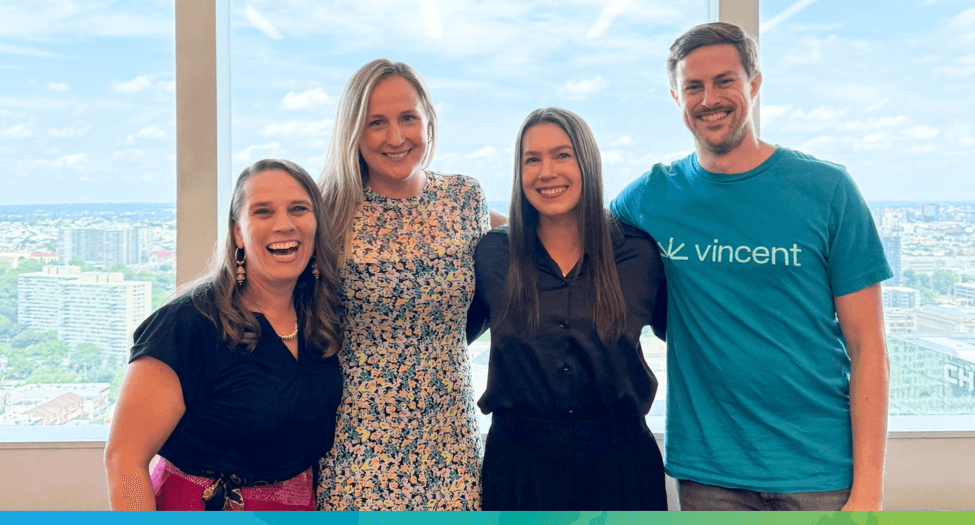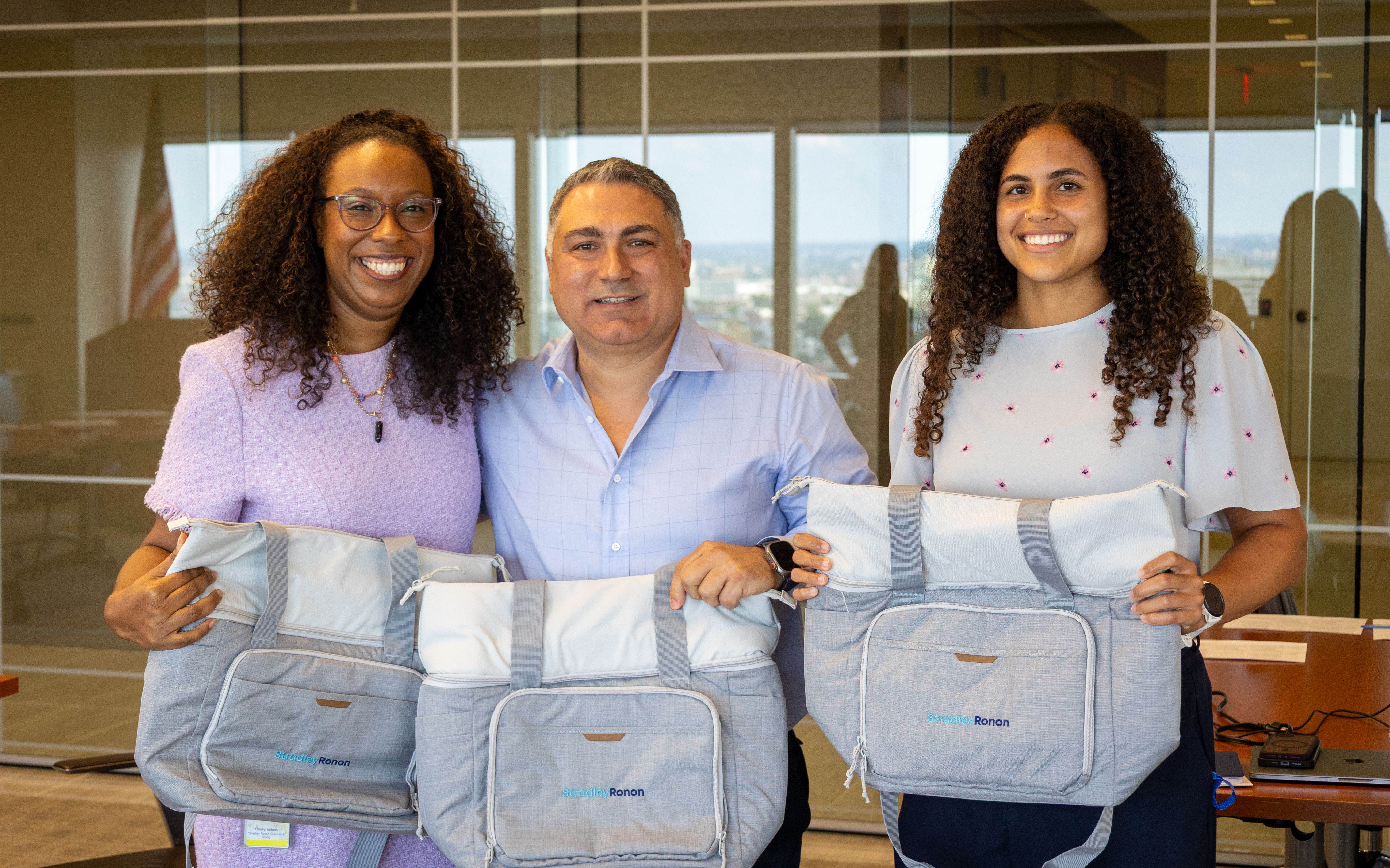A Closer Look: Inside Stradley Ronon's First Gen AI Hackathon
Stradley Ronon's inaugural gen AI hackathon showcases how comprehensive training transforms lawyer attitudes toward AI adoption. From ethics mastery to client communication innovation, discover how their 13-session certification program culminated in teams pitching AI-powered solutions to real practice challenges.

During the hackathon are, from left, Sarah Hirebet, director of knowledge management at Stradley Ronon; and Anusia Gillespie, Kelsy Cocozzo and Jeff Cox of vLex.
The question isn't whether generative artificial intelligence (gen AI) will transform legal practice — it's how quickly law firms can adapt to harness its power effectively.
Sarah Hirebet, Stradley Ronon’s director of knowledge management, recognized a fundamental challenge in AI adoption. “We wanted to find a way to educate our lawyers and business professionals to embrace these tools both ethically and effectively, but in an engaging, hands-on way so that they feel comfortable enough to use them in their day-to-day practice,” she said.
Her solution? Create a comprehensive training program that culminates in lawyers pitching their own AI-powered solutions to real practice challenges.
The Hackathon Experience
Stradley Ronon hosted the firm’s inaugural gen AI hackathon on July 9 in their Philadelphia office, the capstone event of the Stradley Labs Legal Gen AI Drivers Certification program, developed in partnership with vLex.
Approximately 30 lawyers and business professionals gathered to tackle three carefully crafted challenges:
Challenge One: Client Communication Revolution
Redesign and translate legal documents for easier client consumption — transforming complex legal language into accessible, client-friendly communications.
Challenge Two: Privacy-First Contract Review
Balance client privacy concerns while leveraging gen AI to accelerate contract review processes without compromising confidentiality.
Challenge Three: Demystifying Legal Work
Use gen AI to clearly explain the "invisible work of lawyering" — making tasks like clause library analysis transparent and understandable to clients.
The Rigorous Evaluation Process
The hackathon's evaluation framework showcased the program's commitment to excellence across multiple competency areas:
Technical Mastery: Teams were evaluated on their ability to educate clients about how gen AI works in a concise, confident manner while displaying genuine technical competence.
Ethical Leadership: Following American Bar Association Opinion 512 requirements, teams had to clearly address how they would obtain informed client consent, including:
- Specific types of client information input into AI tools.
- Clear articulation of benefits, risks and limitations.
- Transparent communication about tool-specific risks.
Security Excellence: Teams needed to accurately present information about the security measures protecting client data throughout the gen AI process.
Strategic Thinking: Beyond technical execution, teams were judged on their ability to develop use cases well-suited for gen AI that would genuinely add value for clients.
Communication Excellence: Presentations required logical structure, clear calls to action, and persuasive elements including polished visuals and compelling narratives.
The Power of Collaborative Innovation
The judging panel — including Sarah and vLex’s Enterprise Lead, Anusia Gillespie, and Enterprise Customer Success Manager, Kelsy Cocozzo — evaluated solutions that ranged from contract summarization tools to patent research streamlining systems. Each solution emphasized efficiency gains and cost reductions for clients — proving that AI adoption can enhance rather than replace human legal work.
Celebrating Excellence
 Winning team members, from left, include associate Linsay Sobers, partner Paul Cuccurullo, and associate Avery Marz. Not pictured is associate Geena Marzouca.
Winning team members, from left, include associate Linsay Sobers, partner Paul Cuccurullo, and associate Avery Marz. Not pictured is associate Geena Marzouca.
The hackathon's winning team — partner Paul Cuccurullo and associates Avery Marz, Geena Marzouca and Linsay Sobers — exemplified the innovative thinking that emerges when lawyers are empowered to shape their own AI journey. Their solution demonstrated the kind of creative problem-solving that will define the future of legal practice.
The 13-Session Foundation
The hackathon represented the culmination of an intensive certification program that covered:
- Technical Foundations: Understanding how gen AI produces answers.
- Ethical Mastery: Navigating gen AI legal ethics and compliance.
- Practical Applications: Implementing AI in both client and non-client workflows.
- Strategic Evaluation: Using structure frameworks to assess AI's additive value.
- Quality Assurance: Auditing AI output for accuracy and bias.
- Client Relations: Communicating strategies for AI use effectively.
- Advanced Techniques: Mastering prompt engineering for optimal results.
- Change Leadership: Centering the value of human judgment, empathy, how to build trust and harnessing the innovation diffusion curve by working to be early adopters.
Beyond the Hackathon: Building the Future
Following a period of feedback and reflection aimed at harnessing what participants learned in the hackathon and throughout the program, a second cohort of Stradley Labs is set to begin in September. Stradley Ronon is also developing customized training modules, allowing their lawyers and business professionals to focus on specific competencies rather than completing the entire program.
As the legal profession evolves, our partnership with Stradley Ronon will continue to emphasize thoughtful training, ethical grounding and collaborative innovation in the adoption of gen AI tools.
This article was produced in collaboration with Stradley Ronon.
Authored By
Jeff Cox